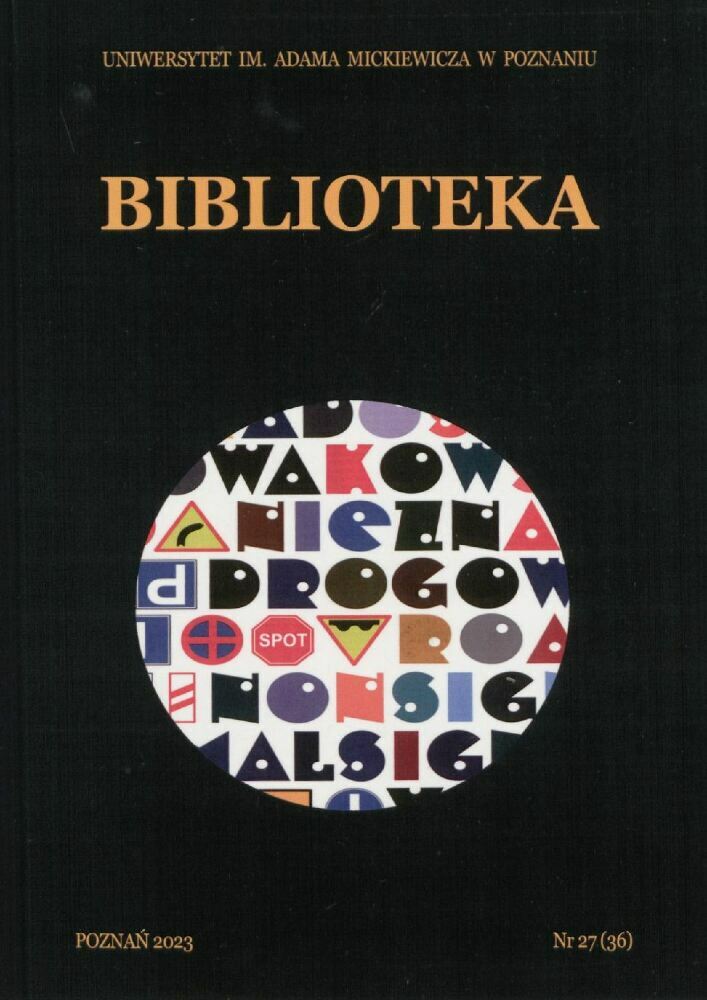Abstract
Support in activities that are aimed at promoting the idea of open science constitutes nowadays one of the essential assignments and tasks facing the academic library. The supporting activities at universities include identifying and implementing relevant research data management services. A systemic support framework for this particular assignment is provided by the Open Research Data Repository for Cracow-based Institutions of Higher Learning (Polish: RODBUK), initiated in March 2023. The number of responsibilities that are executed by the librarians engaged in the development of the RODBUK includes launching new tools that facilitate visibility and measure the use and citation numbers of the data deposited in the repository. The present study is the first project in the literature published in Poland that envisages an application test of broader studies (in a pilot run) that aim to verify the actual utilization of altmetric indicators in research data repositories.
This article aims at two related objectives: an analysis of available research data repositories in terms of the use of altmetric indicators, and the evaluation whether altmetric metrics are used in the repositories based on the Dataverse research data management system. The repositories indexed in the Ranking Web of Repositories and the repositories that use the Dataverse software were selected for the analysis. The review of the literature of the subject and the preparation of the article was based on the analysis and review literature method. A desk research analysis was used to collect available data. The application of the above research method made it possible for the author to analyse and compare the collected information.
The conclusions are the following: altmetric indicators are used in research repositories, albeit on a very limited scale (and in a limited scope). This may have been effected by the fact that the existing data repositories are only at their initial stage of development and the available tools are still not widely used. However, the very idea of summing up the occurrences of mentions on research data in a different number of services and social media, not only on portals that are oriented and geared towards specific research purposes, still presents an interesting alternative in the analysis of the interest and usage of research data.
References
Hicks D. et al., Bibliometrics: The Leiden Manifesto for research metrics, „Nature” 2015, 520, s. 429-431. DOI: https://doi.org/10.1038/520429a
Hou J. et al., How do scholars and non-scholars participate in dataset dissemination on Twitter, „Journal of Informetrics” 2022, t. 16, z. 1. DOI: https://doi.org/10.1016/j.joi.2021.101223
Jaskowska M., Wpływ wskaźników altmetrycznych na doskonalenie systemu oceny wartości prac naukowych w humanistyce, w: Nauka o informacji w okresie zmian. Informatologia i humanistyka cyfrowa, red. B. Sosińska-Kalata, M. Przastek-Samokowa, Z. Wiorogórska, Warszawa: Wydawnictwo SBP 2016, s. 179–193, https://ruj.uj.edu.pl/xmlui/handle/item/32320 [dostęp: 15.06.2023].
Konkiel S., Assessing the Impact and Quality of Research Data Using Altmetrics and Other Indicators, „Scholarly Assessment Reports” 2020, 2 (1). DOI: https://doi.org/10.29024/sar.13
Kowalska M., Altmetria jako przedmiot zainteresowania bibliologii i informatologii, „Przegląd Biblioteczny” 2017, z. 3, s. 324-341. DOI: https://doi.org/10.36702/pb.457
Kratz J.E., Strasser C., Researcher Perspectives on Publication and Peer Review of Data, „PLoS ONE” 2015, 10 (2): e0117619. DOI: https://doi.org/10.1371/journal.pone.0117619
Peters I. et al., Research data explored: an extended analysis of citations and altmetrics, „Scientometrics” 2016, 107, s. 723-744. DOI: https://doi.org/10.1007/s11192-016-1887-4
Priem J. et al., Altmetrics: A manifesto, 2010, https://altmetrics.org/manifesto [dostęp: 15.06.2023].
Rowlands I. et al., Social media use in the research workflow, „Learned Publishing” 2011, t. 24, nr 3, s. 183-195. DOI: https://doi.org/10.1087/20110306
Rychlik M., Epoka cyfrowa i jej nowe wskaźniki altmetryczne, „Biuletyn EBIB” 2013, nr 8 (144), https://ebibojs.pl/index.php/ebib/article/view/417 [dostęp: 23.06.2023].
License
Copyright (c) 2023 Leszek Szafrański, Marta Urbaniec

This work is licensed under a Creative Commons Attribution-ShareAlike 4.0 International License.
Utwory opublikowane w czasopiśmie Biblioteka, na platformie Pressto należącej do Uniwersytetu im. Adama Mickiewicza w Poznaniu od 2015 roku są udostępniane na
licencji Creative Commons Uznanie autorstwa-Na tych samych warunkach 4.0 Międzynarodowe.
Tym samym wszyscy zainteresowani są uprawnieni do korzystania z utworów opublikowanych po 2015 roku pod następującymi warunkami:
- uznania autorstwa czyli obowiązek podania wraz z rozpowszechnianym utworem informacji o autorstwie, tytule, źródle (odnośniki do oryginalnego utworu, doi) oraz samej licencji
- na tych samych warunkach — remiksując utwór, przetwarzając go lub tworząc na jego podstawie, należy swoje dzieło rozpowszechniać na tej samej licencji, co oryginał.
Uniwersytet im. Adama Mickiewicza w Poznaniu zachowuje prawo do czasopisma jako całości (układ, forma graficzna, tytuł, projekt okładki, logo itp.).
Autor zachowuje prawa majątkowe, ale udziela zgody Uniwersytetowi im. Adama Mickiewicza w Poznaniu na wykorzystanie dzieła. Autorzy tekstów zakwalifikowanych do publikacji proszeni są o wypełnienie podpisanie i przesłanie umowy.
Jeżeli autor artykułu nie jest przekonany, że może wykorzystywać cudze utwory (np. ilustracje, fotografie, tabele) w ramach cytatu we własnej tekście musi dostarczyć do redakcji czasopisma zgodę od uprawnionych podmiotów.
Prawa są zastrzeżone do wszystkich tekstów opublikowanych przed rokiem 2015.






